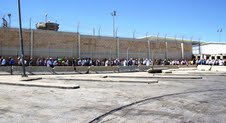Qalandiya, Fri 2.8.13, Morning
Beyond the checkpoint, masses of people on their way to transportation to the mosque run or walk quickly to arrange themselves in a sort of organized disorder to wait at a police checkpoint and then be swallowed up in the buses. The police and the army control regulate their movement.
I think that this behavior by tens of thousands of people, the masses going to the mosque through Qalandiya who have overcome long distances and congestion, the fast and the heat, humiliations and disappointments, to stubbornly take advantage of the loopholes in travel restrictions on Fridays during Ramadan, constitutes a political protest. It’s a political protest accompanied mixed with religious belief, a protest intended to preserve the Moslem character of Jerusalem in the face of all of Israel’s successful efforts to Judaize the city, a protest that demonstrates to Israel and to the world that Palestine is also here in Al-Quds.
the masses going to the mosque through Qalandiya who have overcome long distances and congestion, the fast and the heat, humiliations and disappointments, to stubbornly take advantage of the loopholes in travel restrictions on Fridays during Ramadan, constitutes a political protest. It’s a political protest accompanied mixed with religious belief, a protest intended to preserve the Moslem character of Jerusalem in the face of all of Israel’s successful efforts to Judaize the city, a protest that demonstrates to Israel and to the world that Palestine is also here in Al-Quds.
A little farther on we see the women who prefer to wait for the men and who try to take advantage of the rare patches of shade where they’re allowed to stand awaiting their husbands and the fathers of their children, who emerge much later. It’s clear, a priori, that family members don’t go through the checkpoint together – men and women at two inspections stations far from each other and very different in their operation, the inspection, the criteria – all the women have permission to cross, as well as boys under 12 and men over 40.
Every entry and exit proceeds in the face of weapons and uniforms, through fences and concrete barriers.
Endless interrogations in the women’s line of mothers who want to cross with one of their children older than the cutoff age, and it’s not surprising that the word “arba’tash” – fourteen – echoed repeatedly. The children – youths – usually returned alone. The mothers gave up after their pleas failed to wear the soldiers down. Their purses were sometimes inspected both at the checkpoint’s entrance and exit.
Careful age screening on the men’s line, if not at the first inspection station then at later ones where guards from the private security firm are stationed along with experts at uncovering age-faking. That’s how a man using his brother’s ID was stopped and taken into one of the checkpoint’s rooms, as well as other men who hoped their kaffiyeh or jalabiyeh or premature wrinkles would help, but to no avail. All were driven back.
The presence of Palestinian police officers to keep order outside the checkpoint isn’t as it seems at first - cooperation with the Israeli army. The policemen always remained outside the checkpoint, in an outer perimeter, never stepping into the sterile checkpoint area.
checkpoint area.
On the outskirts of the checkpoint, behind the concrete barriers, Palestinian youths also stood stubbornly for hours, most of them from the adjacent refugee camps, sons of fathers who themselves are sons of Palestinian refugees, born before the second intifada, who want to say, We’re also here, we won’t disappear. They didn’t stay there out of boredom but out of curiosity to see up close what was going on.
A regulation: holders of regular weekday entry permits to Israel are not allowed through on Fridays during Ramadan.
DCO officers occasionally offered praise, and some were very pleased with themselves to see how the organization, the rules and the regulations successfully concealed from view and from consciousness the prohibitions, the despair and the disappointment of those who weren’t able to go through.
At about 10:30, when hundreds of men who didn’t meet the age criteria crowded at the three checkpoint entrances, when the human pens were full and masses of people of all ages streamed out of the building, the long “elderly” line wound like a snake, as did the one from the men’s gate to the point where the selection by age was conducted. Suddenly – the checkpoint’s revolving gate stopped; people on both sides remained standing, jammed together. The loudspeaker told people to leave the area immediately and go to the “humanitarian” line, the line of the elderly outside. There was mass confusion: everyone ran, pushed to secure a place in the winding line, those who had been first arrived last and we heard bitter protests.
Many more police joined those already outside, much confused shouting, hand-waving.
After fewer than five minutes, a new announcement: Whoever is younger than 40 must return to the checkpoint for inspection. More turmoil, more pushing and running. And all when the objects of harassment – that is, the Palestinians – don’t understand why. And why should they know? When things calmed down, Dov, the policeman, explained that there was an altercation inside – or, as he put it: “A Palestinian, blue ID card” (describing the person) attacked someone, now everything’s ok again, the attacker was arrested and everything’s as it should be, only “it took considerable manpower, and it’s harder for us.” I wonder who the victim was.
